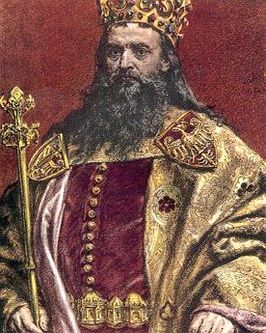
Born: April 30, 1310, Cuiavia (Kujawy), a province of Poland
Died: November 5, 1370
Early days. Father Wladyslaw Lokietek (Ladislaus I the Short), King of Poland 1305-1333; mother Jadwiga Wielkopolska. He was the last Polish king of the Piast dynasty.
Peace treaties.He brought relative peace to Poland. In Vyshegrad (1335) he promised to recognize the suzerainty over Silesia of John of Luxemburg, king of Bohemia; in return John renounced all claim to the Polish throne. In 1339, at the Treaty of Cracow, Casimir officially acknowledged John’s power over the Silesian princes. In 1343 , at the Treaty of Kalisz, he signed a peace with the Order of Teutonic Knights (Krzyzacy) . In return for Kujawy and Dobrzyn, he surrendered Pomerania and Gdansk (Danzig).
Invasion of Red Ruthenia. Mazovia becomes fiefdom.In 1340, following the death of Prince Yurii II Boleslav, Casimir invaded Red Ruthenia, taking Lwow (Lviv) and destroying its fortifications. In 1349, Casimir seized much of the duchy of Halych-Vladimir. In 1351 , he took the Prince of Mazovia (Mazowsze) in fief.
Marriages and liasons.His love live was stormy. First he married in 1325 Anna (or Aldona) the daughter of the duke of Lithuania, Gediminas. She died in 1339. Their daughter was Elisabeth (Elzbieta) who married Boguslaw V Duc of Slupsk (Pomerania). His second daughter with Anna was Cunigunde (Kunegunda), who married Louis VI the Roman, Wittenbach (Ludwig VI der Roemer), the son of Louis IV, Holy Roman Emperor and Holy Roman Elector of Brandenburg. .Casimir married then (after two broken engagements) Adelaide of Hessen. He soon abandoned her and married secretly in 1357 Krystyna Rokicana from Prague. In 1365, on the strength of forged papal dispensation, he married Jadwiga from Zagan with whom he had a daughter Anna. In his will he mentions children by a certain woman named Cudna and there were persistent romantic rumors regarding a Jewess called Esterka (supposed ruins of Esterka castle exist in Kazimierz nad Wisla).
Law and order. Jews given refuge.He strengthened the royal power at the expense of the nobility and clergy; reformed Polish army, codified Polish law in the Statute of Wislica (1347), alleviating the lot of the peasants (hence he was “king of the peasants”). On Oct. 9, 1334, he confirmed the privileges granted to Polish Jews in 1264 by Boleslaw the Pious. He was favorably disposed toward Jews. Under penalty of death he prohibited the kidnapping of Jewish children for the purpose of forcible Christian baptism. He inflicted heavy punishment for the desecration of Jewish cemeteries. Although Jews were present in Poland even earlier, Casimir allowed them to settle in Poland in great numbers, as the Jewish refugees arrived from Germany, and protected them as king's people.
Growth and modernization of towns.He built 50 military fortresses. His reign saw further growth of towns. He gave new towns self-government under the Magdeburg Law .
In 1363 Cracow was turning into a city of brick and stone. Gothic Cloth Hall (Sukiennice) was under construction. Saint Mary’s Church (Kosciol Mariacki) was being remodeled. A new Royal Castle has been built on the Wawel Hill.
In May 1363 King’s granddaughter, Elizabeth (Elzbieta) of Slupsk was being married in Cracow to the future Emperor, Charles IV of Luxembourg, King of the Romans and King of Bohemia.
University of Cracow founded.In 1364 he founded the University of Krakow after long negotiations in Avignon, where Pope Urban had been reluctant to grant Casimir’s petition.. His death however stalled the development of the university (and that's why today it is called Jagiellonian instead of Casimirian).
Congress of Cracow.In 1364 he organized the Congress of Cracow on the occasion of the visit of Pierre de Lusignan, King of Cyprus, trying to raise a new Crusade. At this Congress took part: Charles of Luxembourg, the Emperor; his son Waclaw of Bohemia; King Louis of Hungary; King Waldemar of Denmark; Dukes Otto of Bavaria, Ziemowit of Mazovia, Bolko of Swidnica, Wladyslaw of Opole,and Boguslaw of Slupsk. They all participated at the famous banquet at Nicholas Wierzynek (Wierzynek restaurant exists till today).
Casimir is the only Polish king who did receive and maintain the title of “the great” in Polish history and the title is well deserved. When he received the crown, his hold on it was in danger, as even his neighbors did not recognize his title and instead called him "king of Krakow". The economy was ruined, and country was depopulated and tired with wars. When he left the country, it has doubled in size, grew prosperous, wealthy and had great prospects to the future. Although he is depicted as a peaceful king in children books, he in fact waged many victorious wars and was preparing other ones just before he died on November 5, 1370.
His funeral was on the scale of his reign.
This article uses, among others, material from the Wikipedia article "Casimir III of Poland" licensed under the GNU Free Documentation License. :
Wikipedia
Other sources used:
Norman Davies, God’Playground, A History of Poland, Vol. I, Columbia University Press, New York 1982
Bratleby
Encyclopedia of Ukraine
Britannica
Genealogie Quebec I(in French)
Genealogie Quebec II(in French)
Return to home page:
Prominent Poles